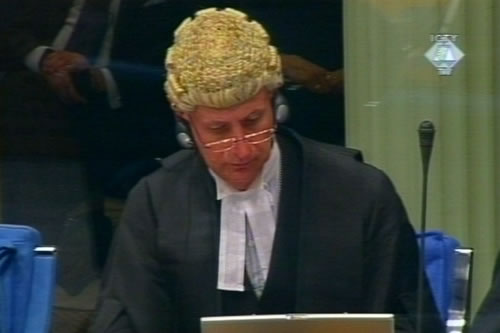Home
MILOSEVIC'S CONDUCT IS GROUNDS ENOUGH FOR THE ASSIGNMENT OF COUNSEL
In its response to Steven Kay's appeal, the prosecution seeks confirmation of the decision assigning counsel to Slobodan Milosevic and wants three new grounds added, including the accused’s inappropriate courtroom conduct.
 Steven Kay
Steven Kay In the prosecution’s view, the Tribunal Appeals Chamber should dismiss the appeal filed by Steven Kay and add new grounds to the Trial Chamber’s decision assigning counsel to Slobodan Milosevic, eliminating the issue from the agenda "once and for all" in order to have the trial continue smoothly and bring it to an end without new delays.
In its response to Steven Kay’s motion seeking that the decision assigning counsel to Slobodan Milosevic be quashed, the prosecution proposes that the contested decision be re-affirmed and that three new grounds be added. The Trial Chamber based its decision on the findings of cardiologists who examined the accused and determined that his ability to represent himself was impaired and limited to such an extent that there was a substantive risk the trial would not be either fair or expeditious.
The prosecution, however, deems that there are other, additional factors "in the interest of justice" that justify the decision to assign counsel to the accused. Its response lists three: the conduct of the accused in the courtroom; his manipulation of trial dates and failure to comply with therapy; and the scale and complexity of the case.
In the prosecution’s view, the accused’s inappropriate courtroom behavior could in itself be sufficient grounds for the assignment of counsel. The prosecution contends that the manner in which Milosevic addresses judges, the insulting remarks in which he presents the Trial Chamber as part of a joint criminal enterprise, his verbal attacks on prosecution witnesses – including Nikola Samardzic, Stipe Mesic and Wesley Clark – his endless political speeches and history lessons, and his wasting of precious court time are all tantamount to abuse and obstruction of the judicial process and sometimes even to contempt of court. This is why prosecutors deem it necessary to add Milosevic's inappropriate courtroom conduct to the grounds for the decision assigning him counsel.
The prosecution further considers the Trial Chamber erred when it did not include Milosevic's manipulations of the trial dates in its decision. When the Chamber did not allow Milosevic the time he requested to prepare his defense, the prosecution claims he "manipulated his health" in order to delay the continuation of the trial for as long as he wanted. According to the prosecution, that is the "only reasonable interpretation" of the findings of the Dutch cardiologist indicating that the accused had not complied with the therapy prescribed to him and had been supplying his doctors with wrong information.
Finally, the prosecution wants the scope and complexity of the case to be listed as one of the reasons for assigning counsel. According to the prosecution, the case is "too big for the accused to be able to deal with it on his own," and at the same time, the case is "too emotionally taxing for him to be able to treat it objectively."
The hearing before the Appeals Chamber about the decision to assign counsel to Milosevic has been scheduled for Thursday, 21 October.
Linked Reports
- Case : Milosevic Slobodan - "Kosovo, Croatia and Bosnia"
- 2004-10-13 MILOSEVIC'S ALL OR NOTHING
- 2004-10-13 APPEALS CHAMBER TO HEAR ARGUMENTS ON THE ASSIGNMENT OF COUNSEL TO MILOSEVIC ON 21 OCTOBER
- 2004-10-12 TESTIMONY ABOUT THE WAR THAT WAS "STAGED" IN KOSOVO
- 2004-10-18 SUBPOENAS TO TESTIFY A "LAST RESORT"
- 2004-10-19 DEFENSE WITNESS BEFORE A "POLITICAL TRIBUNAL"
- 2004-10-20 DUTCH LAWYER VS. DUTCH DOCTOR
